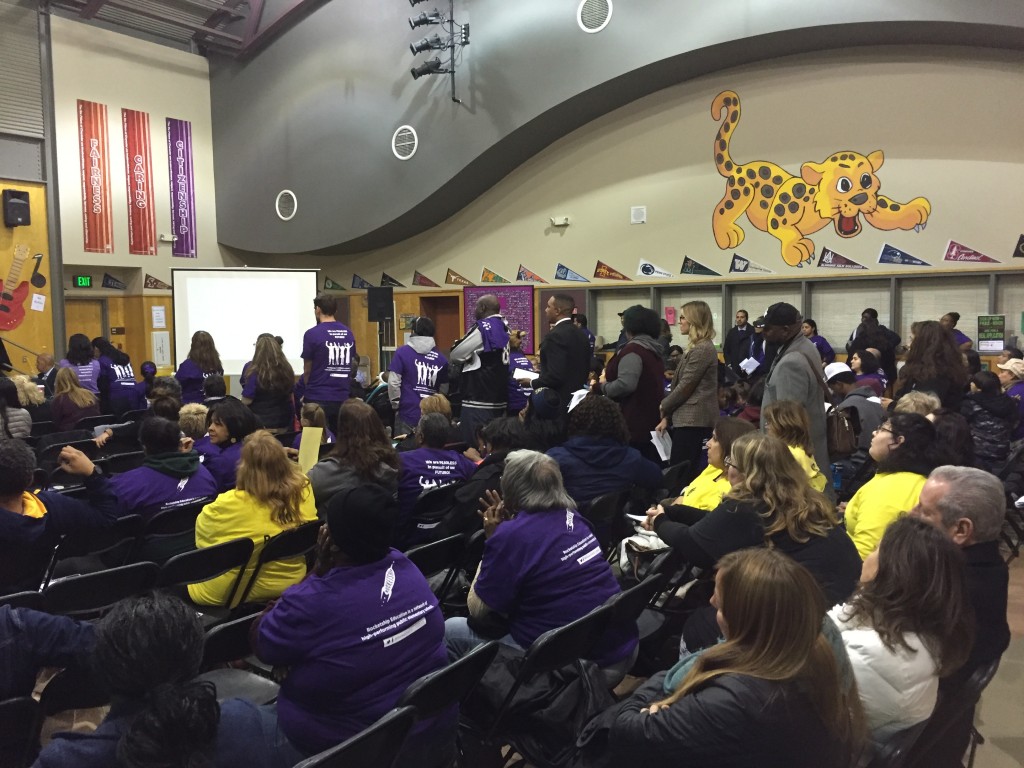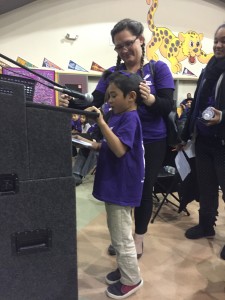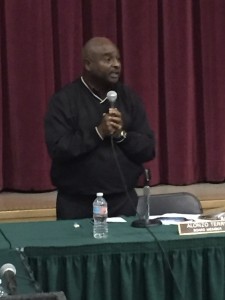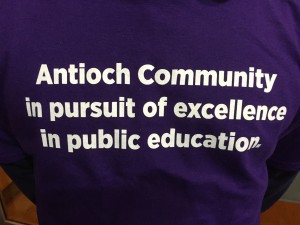Antioch School Board gives Rocketship charter school countdown to blast off

Supporters of the Rocketship charter school in Antioch line up to speak at Wednesday night’s special school board meeting, as other supporters in purple shirts and opponents in yellow shirts listen. Photos by Allen Payton
By Dave Roberts
The Antioch School Board narrowly approved the Rocketship Education charter school petition Wednesday night, eliciting cheers from hundreds of Rocketship supporters packed into the Lone Tree Elementary School multipurpose room who say it will provide a better education for their children than the academically underperforming AUSD-administered schools.
The board’s 3-2 decision approving Rocketship went against the recommendation of district staff to reject the charter school on the grounds that it’s likely to fail and its petition request doesn’t meet the numerous requirements specified in the state education code.

A Rocketship student named Beto, known as a “Rocketeer”, speaks in support of the Antioch charter school.
Rocketship plans to open in 2018 with an enrollment of 386 students. That could cost AUSD’s budget at least $3.7 million based on $9,670 in lost average daily attendance revenue the district receives from the state, according to California Department of Education data. That lost revenue and the resulting teacher layoffs and/or program cuts prompted nearly half of the attendees at the meeting to oppose the charter school application.
But ultimately it was the pleas from dozens of predominantly Hispanic and African-American parents seeking a better education and future for their children that won the day.
“Tonight our community needs a school model that demonstrates cultural responsiveness and authentic community engagement,” said Dr. Lamont Francies, a former counselor in the district and pastor of Delta Bay Church of Christ where Rocketship held a community outreach meeting, last month. “Have we tonight become more interested in saving schools than the students that actually occupy them? This is not about improving teachers but about improving students. We are not questioning effort, but we are assessing outcomes. In my years of education, I’ve encountered many teachers who could not teach, but I’ve never met a student who could not learn.
“So now is the time and the place to change the narrative of the past, and put people over politics and people over paychecks. Our children are more than just ADA. Do you tonight see their future or do you see their finances? In order to change the future we must change our focus. We can no longer focus on saving jobs but saving children.
“Tonight we reject the soft bigotry of low expectations. We see low test scores, low morale, low graduation rates. And based on that assessment, I can say, ‘Houston we have problem.’ It’s time to get on a new rocket. Rockets go where others do not go. Rockets explore where others won’t. Rockets, however, must be fueled. And you tonight are that fuel. And together we can launch our students into a future full of endless possibilities.
“To echo our First Lady, when test scores go low, our students must go high. Right now is liftoff time, it’s game time, growing time. In order to have a change, you must have a choice. When you don’t like Verizon, you change to Sprint. When you don’t like Dial, you change to Zest. Tonight, just like Celie, we choose the color purple.”
The last reference was to the purple shirts worn by Rocketship supporters that contain the slogan “We are FEARLESS in pursuit of our FUTURO!” The Rocketship opponents, who were predominantly white, wore yellow shirts with the slogan “No Rocketship.” Many of them were teachers like Sarah Nichols, who teaches 4th and 5th grade at Lone Tree.
“It’s really hard to be going through all of this on both sides,” she said. “It’s really hard to hear all of this. And it’s frustrating for me as a teacher. I would hope that the money that would be pulled away from our school to support this charter would rather be put into our schools to make them better, maybe our special education department. As the 600-plus students are pulled from our schools to fill this charter, the more than 20 great newer credentialed teachers that will become unemployed in our district would appreciate you saying no to it too.
“We are greatly concerned about scheduling for elementary children [at Rocketship]. Children need to learn non-cognitive skills, social skills, life skills, problem-solving skills through cooperative work and play. There doesn’t seem to be much time if any for socialization skills, play time etc. according to the schedule on the AUSD website for this charter.
“This program doesn’t seem conducive to the educational and emotional development of the child. The schedule is dense and instruction taught continuously with one break at lunch. I believe this will lead to a high level of stress for students. The day is way too long for teacher and students, especially kindergarten students.”
Cheye Calvo, chief growth and community engagement officer for Rocketship, acknowledged that Rocketship schools have longer days than public schools, but he said there’s plenty of time for social and emotional engagement, beginning with a community meeting, songs and dance in the morning. “We find our families engage in a way that is joyful and playful,” he said. “It’s not just sitting. There’s time to be quiet and learn, and a time to be joyful and play.”
The board majority agreed with the Rocketship supporters that low-income minority children deserve the same chance at a quality education as wealthier whites who can afford to send their children to alternative schools.
“The [Antioch] chief of police [Allan Cantando] and the newly elected mayor of Antioch [Sean Wright] both send their children to charter schools,” said board member Walter Ruehlig. “Charters are a great equalizer for those who can’t afford $15,000-$20,000 to send their kids to De La Salle. I wouldn’t want to have to think you have to be chief of police or a mayor or white or middle class or privileged to have that free choice…. After 48 years of public service I’m not going to now turn my back and my ideals and deny a chronically underserved minority population a free choice and the right for their precious children to have a decent and competitive future.”

The slogan on the shirt of a supporter from Concord of Rocketship whose child attends Rocketship’s Futuro school, there.
Ruehlig noted that Rocketship students perform much better academically than AUSD students on average. “Our superintendent is committed to a goal, which we haven’t had in years, a goal of improving 5 percent a year. That would take us eight years if we achieve, if we achieve that goal – we’ve been in stagnation, we’ve been spinning wheels – it would take us eight years to get to where Rocketship is today.”
In agreement was Fernando Navarro, who was attending his last meeting as a trustee, having failed to win election in November. He’s impressed with what he saw during a visit to a Rocketship school as well as the better test scores by Rocketship students.
“I observed the enthusiastic parents, the smiles of the children. [Tonight] I observed those who spoke in favor and those who opposed Rocketship. In favor were parents seeking a better education for their children, parents seeking the fulfillment of the American dream. Who opposed the charter? Those seeking to protect the status quo and willing to take the position of intimidation of anyone who dared to stand up against a system that has failed our children.
“The bottom line is we are the temporary guardians of the children in our schools. The children belong to the parents. The money belongs to the children. Where the children go, the children should have their money. My vote tonight is going to be with the children and the parents in the district. They are already leaving AUSD in record numbers in search of something better. Now with Rocketship we can have something better in Antioch.
“I don’t see division. I see an opportunity. They won’t build their schools for another two years. This gives us as a district an opportunity to get our act together. Let’s compete. One school will not dismantle our whole district. Competition is healthy. It’s the American way. I’ll stand for the rights of Americans to let their kids get the education they deserve every day of the week.”
Board member Debra Vinson said she also has the best interests of the children in mind by voting against the Rocketship application. She’s concerned about “the obvious friction that would come from having a charter school in AUSD also trying to maintain some degree of solvency.” Other concerns include charter schools having less experienced teachers, an insufficient number of low-income white and African-American students, a wait list to get in and insufficient special education programs.
Also casting a no vote was board President Diane Gibson-Gray, who agreed with the staff findings that the charter petition had not met all of the state requirements.

Trustee Alonzo Terry chose to stand while making his arguments in favor of the Rocketship charter school in Antioch during an impassioned speech.
But Alonzo Terry, who like Navarro was attending his last meeting as a trustee having failed to win election in November, cast the deciding vote. He, like Navarro and Ruehlig, visited a Rocketship school. “I was so impressed, I was on my knees,” said Terry. “I wish we could instill what you have and Antioch charter has and do it here [in district-run schools]. We have some of the greatest teachers. Every school is not bad. We get caught up in red tape. Our children are not commodities. They are human reality.”
Ruehlig, Navarro and Terry all expressed concern that the district administration had stacked the deck against Rocketship’s application. Terry challenged the negativity of one of the district’s consultants, asking if she had anything positive to say about Rocketship. Navarro asked the legal counsel how many charter applications she had reviewed and approved – the answer was “hundreds” and “many,” including a previous Rocketship application.
Ruehlig was vexed that the board had only been provided 48 hours to review the district’s 23-page report rejecting the Rocketship application – and that the rejection seemed to be a foregone conclusion. “I’m not happy,” he said. “Why wasn’t this an opportunity for two sides to sit down to work cooperatively to improve the petition. To me the verdict was in. The final chapter of the story looks like it was written before the story even began.”
One possible surprise ending to the story concerns the question of whether the board actually had the authority to make its decision. Dylan Howell, an English teacher at Antioch High, told the board that, according to the state education code, school board terms of office expire on the first Friday in December, which was Dec. 2. Therefore, Navarro and Terry, who failed to win election, and Gibson-Gray, who did win re-election but had not yet been sworn in for another term, were not technically board members.
“There’s only two real board members here,” said Howell. “There is not a quorum. I don’t believe this vote can take place tonight.”
None of the board members addressed his challenge, as the entire Education Code Section 5017 reads “Each person elected at a regular biennial governing board member election shall hold office for a term of four years commencing on the first Friday in December next succeeding his or her election. Any member of the governing board of a school district or community college district whose term has expired shall continue to discharge the duties of the office until his or her successor has qualified. The term of the successor shall begin upon the expiration of the term of his or her predecessor.”
the attachments to this post:

































